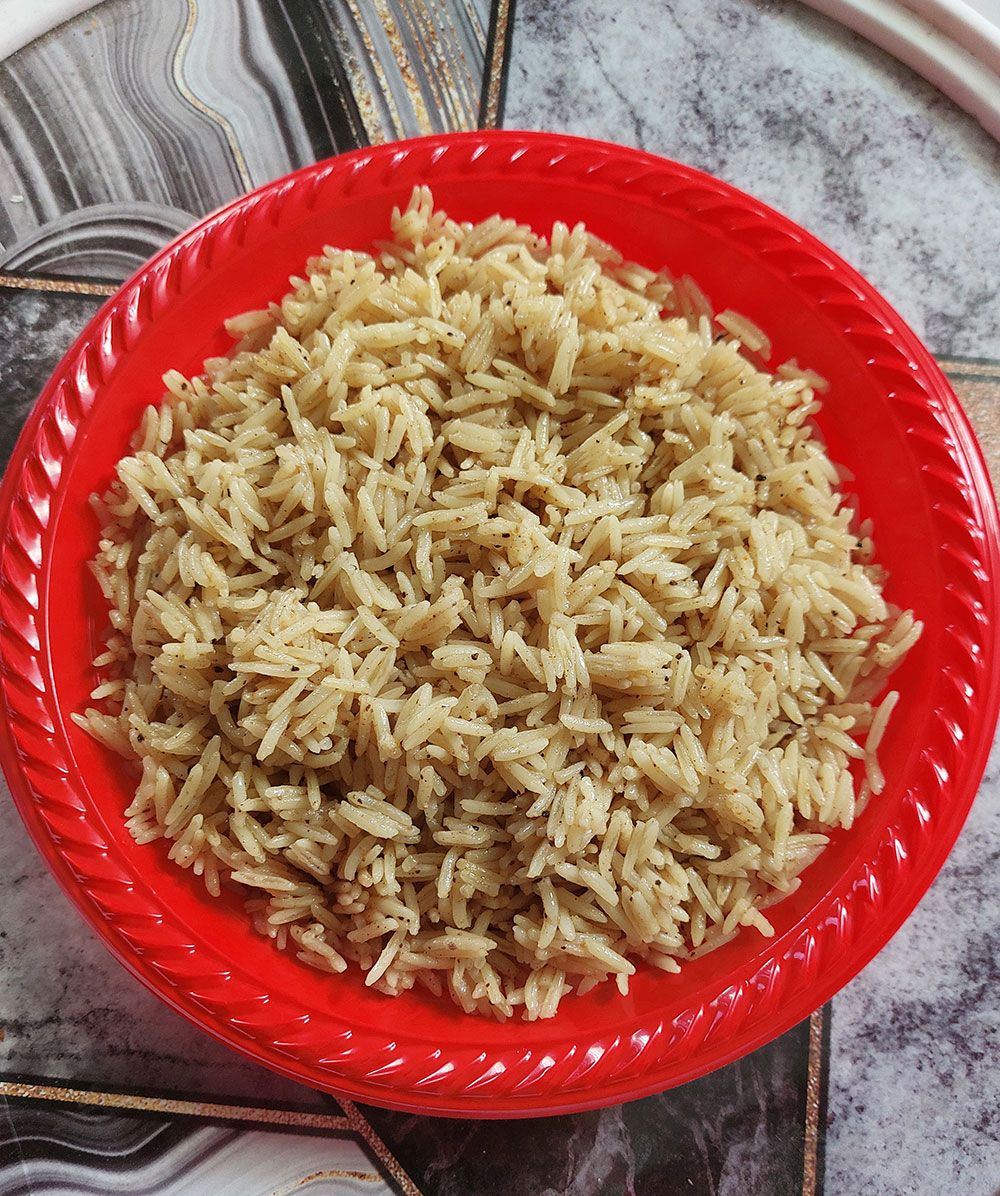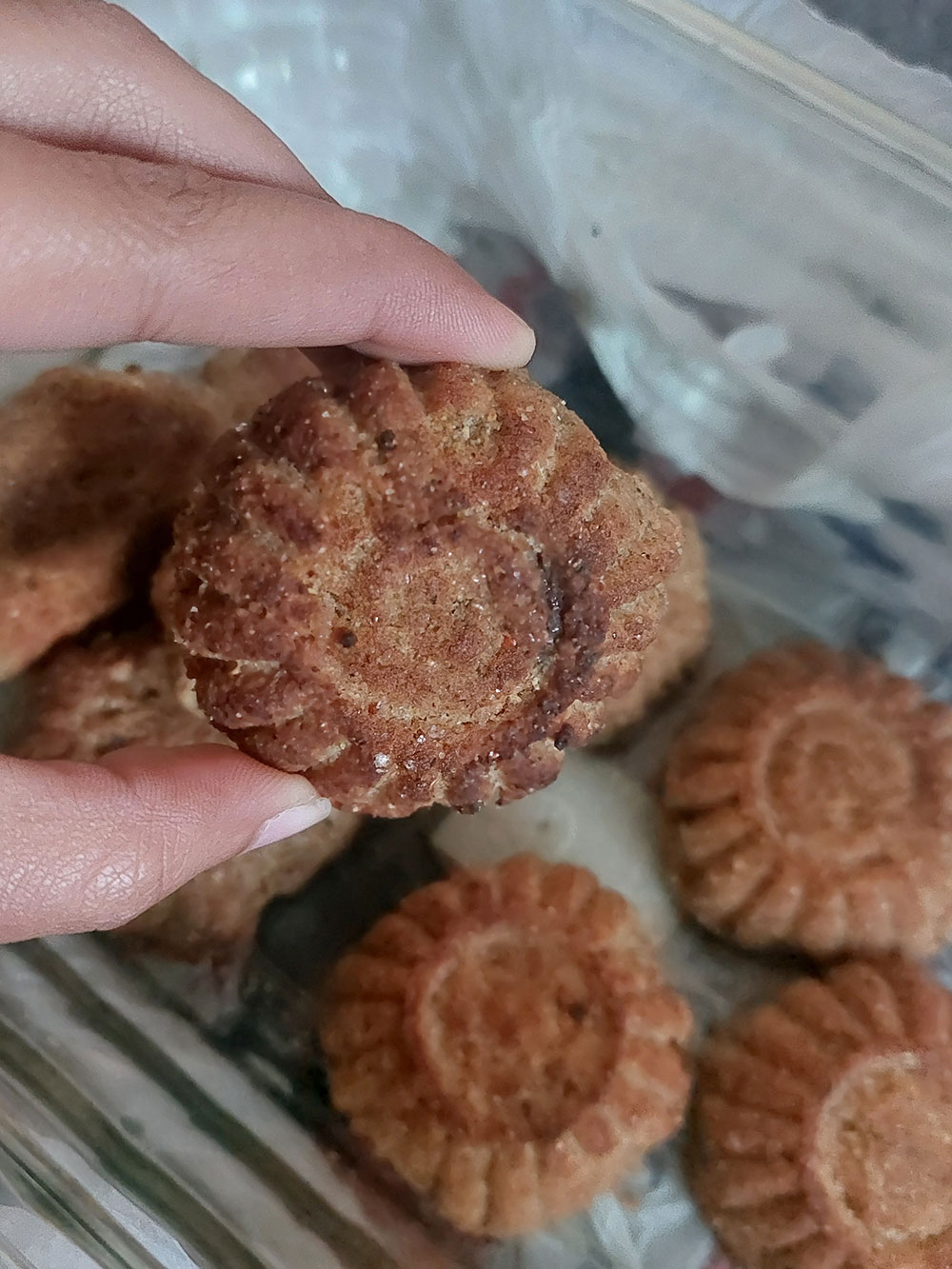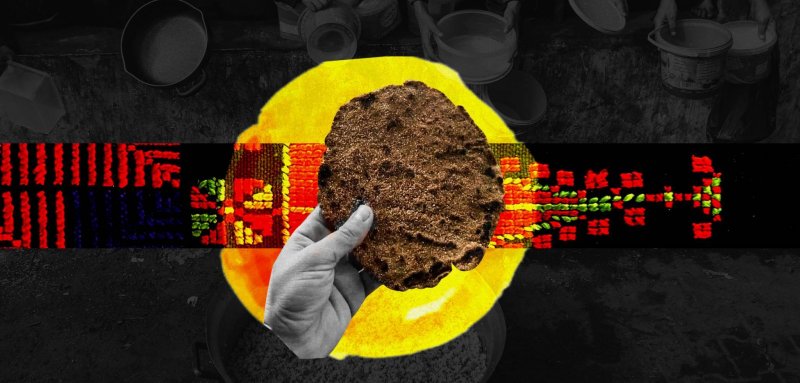We ran out of white flour. So, we were forced to consume the standard meal in Gaza now: barley and corn grain. My family's situation is no different from that of all the other hungry families in northern Gaza. But after I had stomach pains, I rebelled against this "animal feed meal" and refused to eat it. I settled for plain rice, along with some of the instant noodles that I stocked up on before they completely disappeared from supermarkets.
Recently, potatoes have become available, so we started buying them at a premium. But that is okay, the important thing is that we had something to replace the plain rice. After months of deprivation, I had fried potatoes. I truly enjoyed them, as if this was the first time I taste this dish.
Every day, I am overwhelmed by my intense cravings for the foods I love most, especially chocolate. I long for the ordinary routine with three propers meals per day. My desires and cravings have become distant dreams.
This fierce war that has wiped out entire areas of Gaza off the map has also wiped out the luxury of choice. The Israeli occupation has not only killed and displaced the residents of the north, but it has also worked to systemically starve them by preventing aid from entering the north and bombing aid trucks. The world remembers the moment that Israel, just days after the start of the war on Gaza, announced a complete siege on the Strip, which included cutting off electricity, water, food, and fuel. And here are the people of the north, following months of a genocidal war, pleading with the world, through social media, to save them from starvation and famine. They are telling the world that they have had to search for leaves on trees to eat after the occupation bulldozed most of the agricultural lands.
She never imagined she would one day long for a loaf of bread. And every day she consoles herself with a small hope, “After the war, I will never deprive myself of anything I am craving. I will eat all that my heart desires. Everything I have been deprived of eating. I crave pasta with béchamel sauce. I even long for bread with cheese and sliced tomatoes on top.”
They eat animal and bird feed
“This is animal feed, and we are making bread from it. Its smell is nauseating, and its taste is revolting…” says Yasmin Nasser, 23, as she describes the barley and corn mix that Gazans in the north have resorted to grinding into a flour-like substance. “We are tired of war and the sounds of rockets and missiles shaking the ground beneath us. But as the bombing in the north decreased, and we finally thought we could rest, a new suffering began after flour and food ran out at insane speeds,” Nasser adds, “Then the market was flooded with barley and corn, ground animal feed, and corn for birds, which we knead into bread – very bad bread, with a terrible smell and even worse taste, but that's what's available in northern Gaza now.”
Umm Mosab, 42, tells us, while cooking mallow 'khebayze' leaves over a fire, of her longing to cook on her gas stove, as she used to. The smell of the smoke that clings to her clothes bothers her, and she no longer has the luxury of showering after cooking. She and her five children live in a school in the Jabaliya camp after the occupation destroyed their home. “Yamma ('mom' in the Palestinian dialect), I heard people say that the bread we eat is animal feed,” asked her daughter. Umm Mosab did not know how to reply; Should she admit the truth, that she bakes bread from bird food?
 Starving Gazans either have the option of plain rice or bakes made of animal feed and corn grain
Starving Gazans either have the option of plain rice or bakes made of animal feed and corn grain
"After the war, I will never deprive myself of anything. I will eat all that my heart desires"
Yasmin remained with her family in northern Gaza despite the Israeli attempts to push them towards the South, sometimes by shelling around their house and other times through phone calls warning them against staying in a war zone. But now, since the intensity of military operations in the North has decreased, Yasmin and her family are starving. She did not hide her outrage, and never imagined that she would one day long for a loaf of bread, or that she would crave pasta only to find it unavailable in the markets. Each day she consoles herself with thoughts of the future, “After the war, I will never deprive myself of anything I crave. I will eat all that my heart desires. Everything I have been deprived of eating. I crave pasta with béchamel sauce. You know what? I even long for bread with cheese and sliced tomato on top. After that, I won't want anything.”
There is no doubt that what finally comes after a long period of deprivation will bring a special kind of joy. Yasmin keeps dreaming, “We will bake with white flour and make pizza!” Yasmin continued, “[After the withdrawal of Israeli forces from western Gaza] my family headed to my uncle's house, where they found remnants of white flour from before he fled to southern Gaza. We found flour bugs in the flour. But it's okay; we couldn't be picky. We made some flatbread and one pizza. We held a small celebration and relieved our great longing and cravings with a cup of hot tea.”
“My family headed to my uncle's house, where they found remnants of white flour from before he fled to southern Gaza. We found flour bugs in the flour. But we couldn't be picky. We made flatbread and a pizza. We held a small celebration and relieved our great longing and cravings with a cup of hot tea.”
How does a Gazan mother's day go?
Markets in Gaza also lack most vegetables, with most only selling potatoes, onions, and mallow 'khebayze' leaves in very scarce quantities. One might also find eggs, but the price of a single egg can reach 6 shekels (2 US dollars), which most Gazans cannot afford. Some have no choice but to make custard as dinner for their children. However, the rise in the prices of sugar and starch has meant that less people can afford to do this. One might find dates in north Gaza’s markets, and the price per kilogram is 25 shekels (7 US dollars). Some try to stuff their barley and corn grain dough with dates, with one small loaf costing 2 shekels, which is half a dollar.
 Starving Gazans either have the option of plain rice or bakes made of animal feed and corn grain
Starving Gazans either have the option of plain rice or bakes made of animal feed and corn grain
So, how do Gazans spend their day in the midst of this ongoing famine? “I wake up in the morning, send my children with their father to gather wood. When they return, I start the fire. Of course, there aren't many choices; it's either plain rice or mallow leaves. Sometimes good-hearted people send us ready-made rice,” shares Umm Mosab. As for the bread made from barley and corn grain, she says that she bought one kilogram for 50 shekels (14 US dollars). Her children complain about the taste, but she has no other options. At the end of her day, she lies down in her room within the school, smelling like smoke and fire. She sprays perfume on her clothes in an attempt to mask the strong smell. Then, she begins to recall the details of her bitter day while trying to get her five-year-old daughter to stop crying, but the little girl begs, “Mama I'm hungry. I don't want this bread. I want our bread from before the war.” According to Umm Mosab, “We no longer have a shelter, and my husband lost our livelihood — he used to work as a plumber. The war has completely turned our lives upside down. We have spent all the money we had. If it weren't for some kind-hearted people, I don't know what our situation would be like.”
She continues, while wiping the soot from her hands, “I'm tired of waiting for the water cart every day. I'm tired of the chronic sensitivity in my eyes caused by extended periods of time standing in front of the fire. I'm tired of thinking about how we will even manage the next day in the face of rising prices.” Mallow leaves have been a lifeline for her family in the face of rising rice and barley prices. She wonders, “What will we do when it runs out?”
She trues to get her five-year-old daughter to stop crying, but the little girl begs, “Mama I'm hungry. I don't want this bread. I want our bread from before the war.”
Will the world remain indifferent?
On February 19, the Israeli occupation allowed eight trucks of aid to enter northern Gaza. Videos circulated across social media showing residents rushing to get some of the aid, the first truck that has been allowed to enter Gaza since January. Footage shows Israeli forces firing towards the crowds of starving people gathered for their share of white flour, which the trucks were carrying. The next day, the World Food Programme announced the suspension of aid entry to Gaza and its northern region until a safe mode of distribution is found.
Gaza’s Government Media Office has stated that in order to stop the famine currently affecting the population, the northern governorate needs 600 trucks daily, and Gaza City needs 700. The current situation, according to a UNICEF report, has led to acute malnutrition in one of every six children under the age of two. There has also been an increase in the number of children who have died out of hunger. Meanwhile, Israeli soldiers have filmed themselves cooking in the homes of displaced Gazans. These videos are circulating across social media for the world to watch. The article published by Israeli newspaper Haaretz on February 13, titled, In every house in Gaza, we found olives, olive oil and loads of spices. We cook there with mixed feelings, refers to the “moral and ethical dilemmas faced by the army” despite these “ethics” being long non existent.
Raseef22 is a not for profit entity. Our focus is on quality journalism. Every contribution to the NasRaseef membership goes directly towards journalism production. We stand independent, not accepting corporate sponsorships, sponsored content or political funding.
Support our mission to keep Raseef22 available to all readers by clicking here!
Interested in writing with us? Check our pitch process here!



